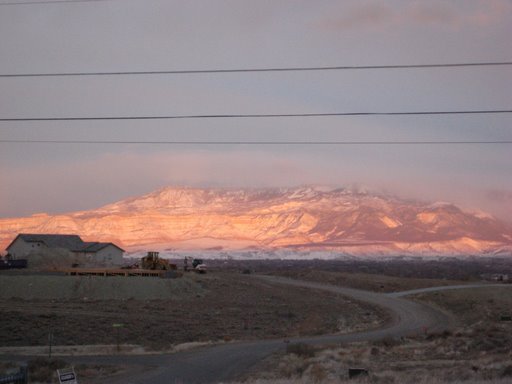Thursday, June 21, 2012
Solar energy investing increasing locally
GRAND JUNCTION, Colo. (KKCO) Industry officials say there are a lot of misconceptions about solar panels. Some may think they're too expensive, others think they're ugly. We found people that say they are neither, and could be the investment of the future.
"It's great for us," says Ron Wilson, who leases panels from High Noon Solar on his Fruita home. "There was no down payment of any money required from us," he says. Wilson's electricity bill has gone down from $120 dollars to $41 dollars a month. "While they were doing the installation on it, one of our neighbors noticed it and came over and they got the pamphlet and contacted them, and they ended up putting them on their home," explains Wilson.
The idea caught on. "We also have a close friend from church; they've installed them on their home." The idea caught on like wildfire.
"Our other neighbor just to the left of us; they're considering putting them on their home and business," says Wilson. And the Wilsons were pleasantly surprised by the look. "It turned out great because we have quite a few people that don't even know that we have solar panels until we mention it to them," says Wilson.
"Leasing has really become prevalent for people, because either they have a hesitation to put a big upfront investment in buying a system, or they just don't have the money available," says Heidi Ihrke, owner of High Noon Solar. Ihrke says if you buy solar panels, you'll recoup your money in ten years. "If they want to have an out-lie of cash at the beginning, and know that they have investment over the long term, and cash flow positive rather quickly," says Ihrke.
Ihrke says after those ten years, you won't be paying an electric bill.
"As solar gets more and more popular, manufacturing costs come down dramatically, and when manufacturing costs come down dramatically, for anything, it means that the product ends up being less expensive," she explains. Making it a win-win for consumers like the Wilson's. "Anybody that I come across, I truly want to let them know about the system, and take advantage of it," says Wilson.
The Excel Energy compliance rebate plan for 2012-2013 opened Wednesday. The program was approved a week and a half ago. The rebate offers incentives for folks to get solar systems on their homes and businesses.
They get rebates every month based on the production of the solar system, in addition to the electricity savings they're already getting from not having to buy that power from Excel. Limited megawatts are available under the rebate plan.
Sunday, June 10, 2012
Nonprofit SEI reorganizes, cuts staff
CARBONDALE, Colorado — Financial and other pressures have forced Solar Energy International (SEI), a nonprofit, alternative-energy training center based here and in Paonia, into what is being called an organizational restructuring.
“A long-term decline in income from our renewable energy training classes and grant revenue forced the board to act,” said SEI board chairman Ed Marston, of Paonia, in a statement issued late Wednesday afternoon.
The decision to lay off several staff members, and to accept the resignation of former executive director Trési Houpt, came after a meeting of SEI's board of directors on June 1.
At that meeting, the board voted 3-2 to move forward with the changes, which were recommended by the organization's management, according to SEI founder and current board member Johnny Weiss.
“There's growing pains, and there's shrinking pains,” said Weiss. “These are shrinking pains.” He said he voted against the changes, but declined to elaborate about the board's discussion or how others voted.
Marston noted that the organization underwent “a kind of a boom in 2009, when we couldn't teach enough classes. We ramped up our activities to deal with it, and when the boom ended we didn't cut expenses to match.”
With the reorganization, he said, the board believes the organization is on firmer financial ground and will grow again.
Officials with the organization were quick to say that the changes do not mean that SEI will immediately abandon Carbondale, the town where the organization was founded more than two decades ago.
“We have no intention of deserting Carbondale,” Marston emphasized.
The most immediate change so has been to terminate five positions, four of them in Carbondale, said SEI Interim Executive Director Kathy Swartz.
The statement about SEI's changes also mentioned the possibility of sub-letting some of its office space, although Marston said a decision about the fate of the Third Street Center offices has been put off until the end of August.
The organization has been renting a single space in the Third Street Center since before the school building was remodeled into a center for nonprofit organizations.
But SEI recently expanded its quarters, spending approximately $150,000 to remodel two former classrooms into one space, and last month held its 20th anniversary party there.
Marston said the board pays “about $3,000 a month” in rent on its 2,240 square feet of office space, which he termed “quite a lot, even for what had been a $2 million a year budget.”
“It didn't help,” Swartz said of the move's effect on the organization's finances.
As things stand now, she said, SEI has a full-time staff of 15 — six in Carbondale, nine in Paonia — and an annual budget that still is “close to $2 million.”
She explained that roughly 90 percent of SEI's income comes from classes on photovoltaic installations held at the six-acre Paonia campus.
According to Weiss, that campus was created about eight years ago in response to the rising costs of doing business in the Roaring Fork Valley.
The Carbondale offices, Weiss explained, have focused on administrative functions and on the outreach programs.
Those outreach programs offer low-cost, alternative-energy education to students locally and elsewhere in the U.S., including Native American communities, and around the world.
The outreach programs, Weiss said, “don't really make us any money. They cost us money.”
Those costs, he said, have been largely covered by grants and other sources of income, many of which have dried up in the national recession.
Swartz and others said the goal is to find other grant income to replace what has been lost, with the hope of retaining the outreach programs.
Subscribe to:
Comments (Atom)




